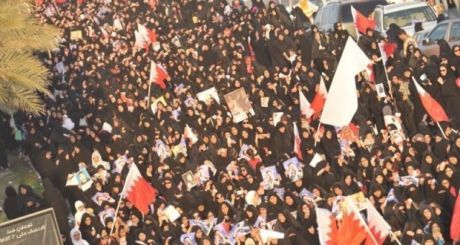News
You are here
Bahrain: fearless resistance

September 28, 2013
Hundreds of thousands of peaceful pro-democracy protestors marched on Friday, September 27 in the largest protest in months in Bahrain.
Although the rally was reportedly approved by the government, its forces used internationally prohibited shotgun and teargas in attacks in several parts of the country on the day. Around 300,000 participated in the rally. This is a huge proportion of the total population of the island, which is approximately a million people. Several opposition political parties and leaders attended the rally.
Demands
Yousif Al-Muhafda, head of the monitoring section at the Bahrain Centre for Human Rights, said that protestors hold King Hamad Al-Khalifa responsible for crimes committed over the past two years, since the beginning of the revolution. He also said that they demanded the resignation of Prime Minister Khalifa Al-Khalifa, who has been in his position for over 40 years.
Protestors also insisted on their rights to self-determination and justice. According to the opposition party, Al-Wefaq, the participants in the demonstration demanded the constitutional principle that states, "The people are the source of all powers." The official statement also said, "We will continue our struggle, day and night, no matter the sacrifices."
The tamarod (rebel) movement in Bahrain also announced that there will be a mass demonstration in Manama, the capital, dedicated in solidarity with the detained political leaders, especially those who were sentenced to life in prison, including Abdulhadi Al-Khawajah.
Intervention
While protestors insist on their right to self-determination and reject any foreign intervention, the Western-backed Bahraini regime continues to welcome interventions—mainly from Saudi Arabia. Backed by the West (including Canada), the Saudi and Bahraini regimes have committed crimes against humanity on peaceful protestors and activists. The Saudi troops that participated in the brutal attacks on peaceful protestors have not completely withdrawn yet. Bahrain is also the home to the United States’ Fifth Fleet.
In a recent speech to the UN General Assembly, US President Obama talked about “efforts to resolve sectarian tensions that continue to surface in places like Iraq, Bahrain and Syria.” Describing the situation in Bahrain as “sectarian tensions” undermines the revolution that has a very strong base amongst Bahrainis from different religious, political and social backgrounds. The protests that have drawn hundreds of thousands of Bahrainis send a strong message that the majority of the people support the demands for freedom and true democracy. Instead of addressing these issues, the government of Bahrain responded to Obama’s claim by labeling the protestors as “terrorists.” The Interior Minister of Bahrain, Rashed Al-Khalifa, claimed that his government is only confronting “terrorist acts.”
Solidarity
As Bahrainis prepare for the next mass demonstration and another phase of the Tamarod campaign, it is important to continue being in solidarity with the Bahraini people. The best way to do this is to expose the Western regime that backs the Bahraini monarchy and to reject any arguments that undermine the revolution and the demands of people for real democracy, freedom and social justice.
Section:










